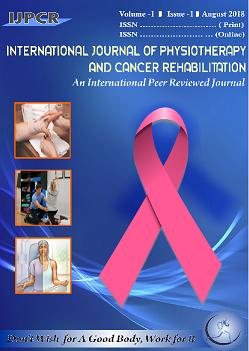International Journal of Physiotherapy and Cancer Rehabilitation
SEARCH
Our Founder
Popurlaly known as ‘jannu bhai’, the Late manishi’s vision, farsightedness and sacrifice have enabled us reach the stature we enjoy today More...Vice Chancellor's Message
It gives me immense pleasure to learn that the 1st volume of international journal of physiotherapy and cancer rehabilitation is being More...Cover Page Volume I Issue I
 .
.
IJPCR
WSH approach towards stroke rehabilitation and prevention
Dr. Syed Mohammad Waris Associate director academics at London academy of sports and health sciences UK.
Abstract:
What is stroke?
Acute focal cerebral deficit resulting from vascular disease lasting more than 24 hours’ Stroke is sometimes called a “brain attack”. With a heart attack, blood supply to the heart is reduced or stopped. With a stroke, blood supply to part of the brain is reduced or stopped. This means that part of the brain does not receive enough oxygen. Millions of brain cells die every minute during a stroke, increasing the risk of permanent brain damage, disability or death. One common cause of blockage that leads to stroke is blood clot or build –up of fatty deposits (arteriosclerosis) in blood vessels that supply the brain. The reduction in blood flow results in an ischemic stroke. Most strokes are ischemic. Another common cause of stroke is a leaking vessel in the brain. This is called a hemorrhagic stroke.
TYPES OF STOKE
The reduction in blood flow results in an ischemic stroke.
Most strokes are ischemic.
CAUSES OF ISCHEMIC STROKE
•Thrombus
•Calcific debris
•Atheromatous
•Arterial
•Vegetation
•Embolism
•Cardiac source
•Valvular heart disease
•Atrial fibrillation
•Myocardial infarction
•Carotid or vertebral
•Artery source
•Atheroma
•Dissection